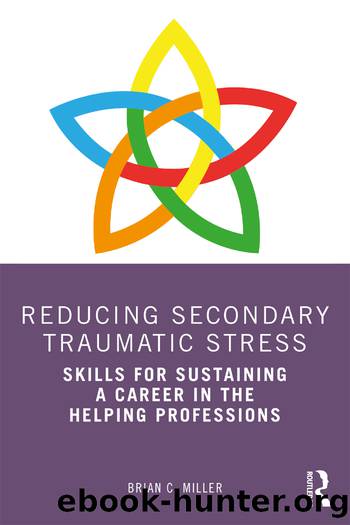Reducing Secondary Traumatic Stress: Skills for Sustaining a Career in the Helping Professions by Brian C. Miller

Author:Brian C. Miller [Miller, Brian C.]
Language: eng
Format: epub
ISBN: 9781000415582
Publisher: Taylor and Francis
Published: 2022-08-15T00:00:00+00:00
Foundational Narratives
There is an anonymous sayingâoften apocryphally credited to Ronald Reaganâthat âSome people wonder all their lives if theyâve made a difference. The Marines donât have that problemâ. If you have consciously cultivated your narrative, you donât have that problem either. You work to alleviate suffering of another human being. You have the capability to transform trauma into growth. You have the luxury of having a vocation in which no one can question that what you do has meaning. But I fear that you only think about the difference that you are making when you read a passage such as this, or when you attend a conference. How personally affected you are by the drive to make a differenceâand how connected you remain to that purposeâwill potently affect your willingness to engage in your work, and how you experience the stress events within it. If you are doubting that what you do makes a difference, stress and trauma exposure will certainly affect you negatively.
An essential foundational schema is that you believeâdeeply and in a felt wayâin the importance of your work. Everyone in the helping professions will profess that they do this work because they want to help others. But it is those who feel a connection to that purpose deeply and often that are doing well in their roles. Sri Nisargadatta Maharaj said that, âthe mind creates the abyss, the heart crosses itâ (Maharaj, 2017). We must feel the purpose of our jobs in an embodied way to cross the abyss of how difficult and painful the work can be. Our clients canât be merely characters in our personal fiction. We canât just say it or think it; we must feel it. And for those for whom this sense of purpose is only a conceptâas opposed to a deeply experienced connectionâor those who are consumed by mere survival in their jobâthis sense of purpose must be conscientiously cultivated into a foundational narrative.
You recite a foundational narrative to others when they ask you why you do what you do for a living. You have a narrative that you employed when you had your job interview in response to the question âWhat is your interest in this position?â If you were giving a talk at a professional conference entitled âWhy This Work Mattersâ, youâd have a pretty good idea what you would say.
But here is the challenge: when was the last time that you felt an emotional connection to that purpose statement while you were doing the work? Was it yesterday? Did you think of it once last week? At least once last month? All of us have a narrative about the importance of our work. But the busy-ness andâfranklyâthe monotony of some of our work, takes us away from this narrative.
In order to tell our story properly, we have to remember our story. And we need to tell that story on purposeâto ourselves as well as to others. Those who thrive in long careers in this work have a personal sense of meaning in it.
Download
This site does not store any files on its server. We only index and link to content provided by other sites. Please contact the content providers to delete copyright contents if any and email us, we'll remove relevant links or contents immediately.
| Anesthesiology | Colon & Rectal |
| General Surgery | Laparoscopic & Robotic |
| Neurosurgery | Ophthalmology |
| Oral & Maxillofacial | Orthopedics |
| Otolaryngology | Plastic |
| Thoracic & Vascular | Transplants |
| Trauma |
Periodization Training for Sports by Tudor Bompa(8271)
Why We Sleep: Unlocking the Power of Sleep and Dreams by Matthew Walker(6722)
Paper Towns by Green John(5189)
The Immortal Life of Henrietta Lacks by Rebecca Skloot(4587)
The Sports Rules Book by Human Kinetics(4386)
Dynamic Alignment Through Imagery by Eric Franklin(4216)
ACSM's Complete Guide to Fitness & Health by ACSM(4060)
Kaplan MCAT Organic Chemistry Review: Created for MCAT 2015 (Kaplan Test Prep) by Kaplan(4012)
Livewired by David Eagleman(3772)
Introduction to Kinesiology by Shirl J. Hoffman(3769)
The Death of the Heart by Elizabeth Bowen(3620)
The River of Consciousness by Oliver Sacks(3604)
Alchemy and Alchemists by C. J. S. Thompson(3520)
Bad Pharma by Ben Goldacre(3427)
Descartes' Error by Antonio Damasio(3277)
The Emperor of All Maladies: A Biography of Cancer by Siddhartha Mukherjee(3162)
The Gene: An Intimate History by Siddhartha Mukherjee(3098)
The Fate of Rome: Climate, Disease, and the End of an Empire (The Princeton History of the Ancient World) by Kyle Harper(3067)
Kaplan MCAT Behavioral Sciences Review: Created for MCAT 2015 (Kaplan Test Prep) by Kaplan(2986)
